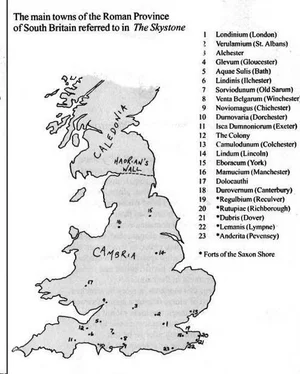Britannicus had his back against the wall and faced five armed men. I yelled something as I threw myself towards them, and they turned to see who I was. As they did so, the Commander slashed one of them, who fell to his knees and then keeled forward onto the cobbles.
Then I was among them, hacking and slashing with my sword in one hand and my dagger in the other. I must have been a threatening sight, because the first man facing me panicked and turned as if to flee. I jumped at him and got my left arm around his neck, pulling him back into me and on to my hard-stabbing blade. I felt him arch and die and I thrust him forward, towards his companions and off my sword. As he fell away from me, I felt my shoulder being grabbed and pulled, and then, for the second time within minutes, I was scrabbling around on the ground again, fighting for my life against a large, unknown enemy. A fallen sword clanged on the ground by my head as I struggled, and then my assailant, who was above me and about to finish me, went rigid and collapsed on top of me. I heard running feet and then the clatter of hooves and much shouting and yelling, and I discovered that I did not have the strength to push away the body that lay on me.
Plautus had arrived, with others, and two of our attackers were taken alive. Britannicus helped me to my feet and I leaned against the wall, exhausted, trying to catch my breath while a confusion of voices rattled around me. I heard Plautus say, "Five of the swine. They were determined to get you, Legate."
I had to hawk and clear my throat before I could raise my voice. "Six, " I said.
"No, five of them. None got away, Varrus. There were five."
"Six, " I said again, my voice weak and my stomach heaving. "There's another one up there in the street above us. He jumped me as I ran by." I turned to the wall behind me and vomited.
"Lars and Pector, get up there and check. Bring the body back here." I felt Plautus's hand on the back of my neck, cold and strong. "By the Christ, Publius! I never knew anyone like you for puking after all the fun is over. Are you all right? Are you wounded? I can't see you for blood. Is any of it yours?"
I managed to shake my head, but of course, as I later discovered, some of it was my own. My cut ear was bleeding heavily.
By the time I had regained my self-possession, the two men Plautus had sent to search for the body in the street above had returned, dragging the corpse between them by the heels. Another of the soldiers had found a handcart and the rest of the bodies were thrown onto it. As they threw each body onto the cart, Plautus examined the dead faces by the light of a lantern. "Well, well, " he said. "Look what we have here." The last man, the one who had been dragged back from the street above, was "The Smiler, " Primus Seneca's factotum tribune. None of us was surprised, and no one said anything. The others were all unknown to us and obviously street ruffians hired for the occasion. The two prisoners were set to work pulling the loaded handcart back to the fort. I walked between Plautus and Britannicus, both of whom were unhurt. Needless to say, Caius Britannicus did not leave Colchester at first light. He made a formal report of the incident and brought a formal charge against Seneca as the instigator of the assassination attempt. No one, including Theodosius, had any doubt of the veracity of the charges levelled, but nothing could be proved against Seneca. His defence was that his subordinate, in a rage of misguided loyalty to his principal, had decided on his own initiative to revenge what he took to be a series of insults to his Commander and had hired assassins to carry out his orders. The assassins themselves had dealt only with "The Smiler." They were executed that same day, and in the absence of conclusive evidence, Seneca was legally exonerated of any complicity in the matter.
By the time Britannicus did leave, twenty-four hours behind schedule, the love between him and Seneca had grown no deeper. In the meantime, I had managed to have my ear bound up and to get a good night's sleep.
XI
The mother of my house servant died about a month after Britannicus's visit. The event had no significance for me personally; I would not remember it at all were it not for the fact that I had an unexpected visitor on the first night I spent alone at home without my servant and his wife. My leg had seized up on me again that day, with far less ferocity than on the previous occasion but still with sufficient malignity to send me home for the day from the smithy. I had spent the afternoon reclining on a couch with my leg supported on a pile of cushions, reading the scrolls that my grandfather had left to my attention. The one dealing with his newly perfected method of pouring solid metal sword hilts fascinated me, and I was rereading it for about the tenth time when I heard someone at the door of my house. I got up from my couch, pleased to notice that my leg felt fine again, and went to the door, where I stood blinking without recognition at the tall shape that faced me, silhouetted against the late-afternoon sun.
"Publius? Master Varrus? Do you not know me?"
I squinted against the glare, tilting my head to one side, and recognized him.
"Bishop Alaric!"
I ushered him inside and led the way to the chamber I used as a dayroom. "I didn't recognize you, standing against the sun the way you were. I certainly didn't expect you. Sit down, please." He seated himself in one of the big, padded armchairs my grandfather had loved. "Will you drink some wine with me?"
"Yes, " he said, smiling, "I would like that." After I had served the wine, I sat opposite him, wondering what his visit could be about. We drank in silence for a few minutes as I searched for something to say that would not sound too foolish or too curious. He saved me from embarrassment by speaking first.
"I enjoyed our meeting last month, Master Varrus, and I have been thinking of you, intermittently, ever since."
I was intrigued. "You have?" I said. "Why? Why should you think of me?
Or even remember me?"
He smiled. "Why should I not? Do you believe yourself to be unmemorable?" I gave him no reaction and he continued. "I remembered you because of your calling, first of all, and then because of some of the things Caius Britannicus told me about you on our journey to Verulamium following the attempt on his life. You are a craftsman in metal, he told me. More than a simple smith."
It was on the tip of my tongue to say something modest and self-effacing, but then I recalled what I had so admired about this man —his simplicity of speech. "Aye, " I said. "You could say that, almost. I am a craftsman in iron."
"Only in iron?"
"Mainly in iron. It is the metal I prefer above all others. I work from time to time with bronze and brass, too, and copper. But I prefer iron. I find it has more..."
"More what?"
"Character, I was going to say, but I think challenge would be more accurate."
"You enjoy challenge?"
"Aye, doesn't everyone?"
He smiled again. "No, Master Varrus. Not everyone does. What about silver?"
"Silver?" I indicated my disdain with a small shrug. "A fine metal, for jewellers. What about it?"
"Have you worked with silver?"
"No. Silversmithing is a craft all on its own. It's more art than discipline, if you know what I mean. He said nothing, obviously waiting for me to continue. "Silver is too soft, too malleable to appeal to an ironsmith. It has a delicacy, a fragility, that sits ill with the kind of strength and directness the ironsmith brings to his craft. Why do you ask me about silver?"
In response, he reached inside his long robe and produced a sheet of folded papyrus.
"Have you ever seen the likes of this before?"
I took the sheet and opened it to find the inner surface covered with a delicate tracery of curves and swirling, intricate shapes.
Читать дальше









